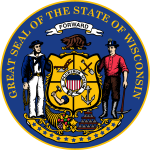| |||||||||||||||||
| |||||||||||||||||
 County results Proxmire: 50–60% 60–70% 70–80% 80–90% | |||||||||||||||||
| |||||||||||||||||
The 1976 United States Senate election in Wisconsin was held on November 2, 1976. Incumbent Democrat William Proxmire defeated Republican nominee Stanley York in a landslide, taking 72.20% of the vote.


